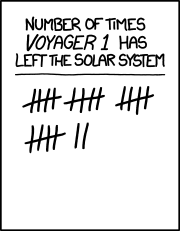It being past the heliopause is "out of the solarsytem enough" the most distant comets may be under the influence of the sun's gravity still but they're out of the heliopause as well. It just depends on what you want to define as "our solar system." Is it all bodies that are attracted to our sun? Then no, Voyager is still in it and will be for a very, very, long time.
Or is it past the heliopause? The heliopause is the boundary where the Sun's solar wind can no longer push back the interstellar winds. Voyager is now beyond this point, it's in the interstellar medium. This was considered "out of the solar system enough" for NASA to make the declaration (among other factors too, like a change in the magnetic fields and such.)
One way or another it's remarkable what Voyager has achieved and CONTINUES to achieve. I mean we're talking about a probe launched in 1977 that's now been operating longer than most cars people own. It's still out there running on power, gathering data and sending it back. It's got some wear and tear on it, some systems no longer working and that will be shut down over time as its fuel cells continue to degrade. But, come on, this thing is still trucking out there like nothing else and that's simply an amazing achievement.
Breaking the heliopause and getting out into interstellar space is just... Wow. And she continues to go. 250-Khz CPU, 64 KB of memory your average digital watch would run laps around Voyager's computers. But she's out there trucking. Something to be proud of.


